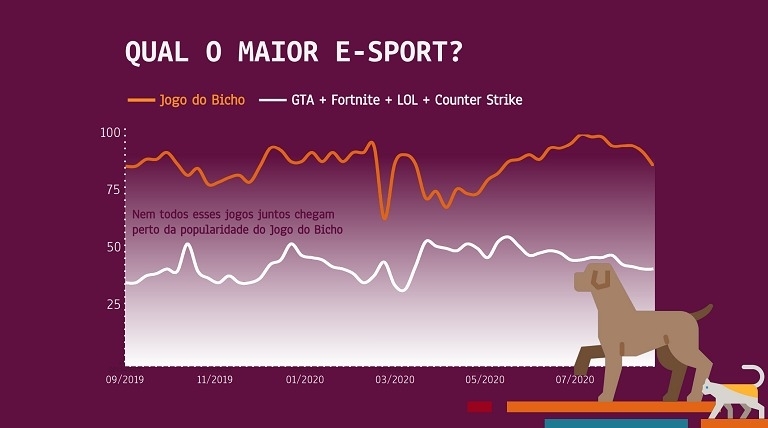

Cavalcanti's independent study is entitled “JOGO DO BICHO IN BRAZIL: A brief analysis of the relevance of betting in the country” and was born from the author's experience in seeking different topics to understand the public connected to web. The data are based on Google Trends, from the period from September 2019 to August 2020. The document can be downloaded on author’s own website.
When looking for what topics are most searched on Google by Brazilians, the analyst on digital research, market research and behavior on the networks identified that the ´jogo do bicho’ is among the 25 most sought after topics, walking alongside results of football games, interest in weather, Gmail and Google translator.

Polli Cavalcanti is an advertising and technology specialist for business. The 31-year-old from Pernambuco has lived in São Paulo for 6 years and has been working with digital information analysis since 2011. She is Supervisor of Information at BITES and her current projects involve creating and analyzing methodologies, procedures and technologies for digital research, market research, political repercussions and behavior in networks.
In the analysis, she identified, for example, that in the area of gaming, the most researched topic is ‘jogo do bicho’, quite distant from others "modern" ones such as eSports GTA, Fortnite, LoL and Counter Strike. "Even these four together do not come close to the popularity of ‘jogo do bicho’ in the research of Brazilians," she highlights in her study.
“I work with data analysis on the internet and I carry out some studies for personal interests, and this was one of them. I was trying to understand the differences in the Brazilian's interests during the pandemic and I came across this discovery, which particularly excited me to learn more. I came to the conclusion that the ‘jogo do bicho’ is very present in the Brazilian's daily life and that not everyone is aware of how current the topic is,” comments Cavalcanti.
Cavalcanti identified that there was a 140% increase in the demand for ‘jogo do bicho online’ in the first month of the confinement caused by the pandemic of COVID-19. Cavalcanti says she knew about the game's popularity, especially because she saw queues of people betting, close to work and home. "But the big surprise of the study was to see that the topic disputes - and goes beyond - digital products, which would be much more identified with the younger audience that uses the internet," she analyzes.

According to Cavalcanti, the study shows a lot about the interested public. “As it is a game with more than a century of history, it may be common to think that the gambler is a traditional and 'analogue' person and that the game has lost its popularity, when in fact they are digitally included people. The ‘jogo do bicho’ continues to attract the attention of more people than anyone could imagine,” she explains among the conclusions.
As it was a one-off study and without a basis for extrapolating the numbers to the Brazilian population as a whole, Cavalcanti says that three out of four Brazilians have access to the internet and that Google is the most accessed site in the country: “This gives an idea of the greatness of the network and the importance of understanding the interests of users when using search engines.”
For comparative purposes only, Cavalcanti says she identified in her study that "the search for some sports betting sites that invest heavily in digital communication is nowhere near the interest in the ‘jogo do bicho’ game.”
Source: GMB